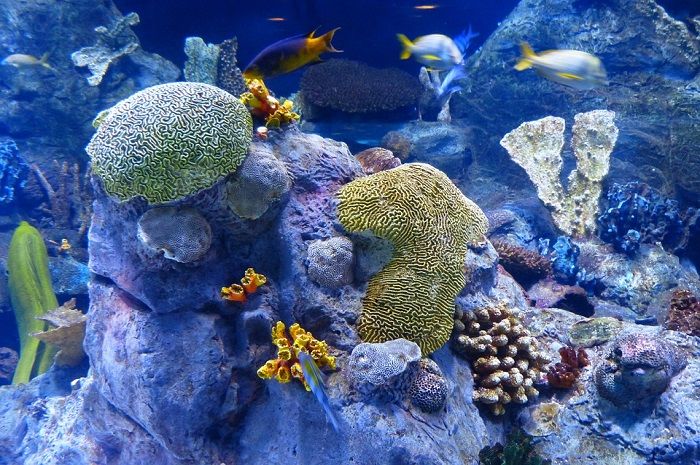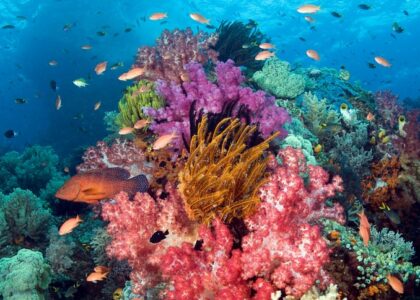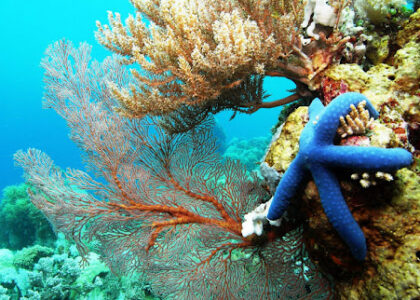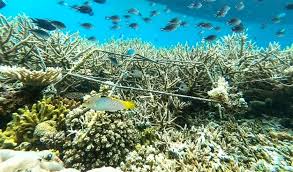Connect To Sea – Indonesia’s wealth is not only on land, but also in the sea including coral reefs.
Indonesia is a maritime country with a very wide sea area, so there are many beautiful seas with coral reefs in it.
This time, in social studies material, friends will learn ways to protect coral reefs in the sea that humans can do.
First, let’s get to know briefly, what exactly are coral reefs?
Coral reefs
Coral reefs are large underwater structures consisting of the skeletons of colonial marine invertebrates called corals or corals.
Coral species build coral reefs known as hermatypic or hard corals.
This name was given because coral extracts calcium carbonate from sea water to make a hard and durable exoskeleton to protect its soft body.
However, there are also corals that form soft coral reefs that resemble plants and trees.
So, when there are thousands of corals forming colonies, the corals will form corals.
Many coral reefs can be found in Indonesia because the sea water temperature is suitable, namely between 21 and 29 degrees Celsius.
If the sea water temperature is lower or higher than that, coral reef growth will be poor.
This exact temperature is obtained because Indonesia is a tropical climate region.
So not only is plant growth on land fertile and diverse, but the sea is also full of coral reefs.
So, to maintain the richness of coral reefs, there are several things you can do.
How to Protect Coral Reefs
1. Maintain the cleanliness of rivers and coastlines
The flow of water in a river may seem far from the ocean, but the end of that flow is the vast sea.
So the condition of the water in the river can also affect the condition of the waters which are the habitat of coral reefs.
Therefore, it is important to keep the rivers around us clean from various kinds of rubbish.
Garbage that is carried by rivers and ends up in the sea can disrupt the growth of coral reefs and marine animals.
We must also do the same thing by keeping the beach clean.
Garbage on the beach can be carried by currents and enter the ocean, disturbing coral reefs.
2. Prevents Erosion
Erosion is the process of wearing away the top layer of soil which can have an impact on coral reefs in the sea.
The occurrence of erosion is normal, but when it occurs in excessive amounts due to human activities, this condition can have a bad impact.
Sediment or small rocks that are eroded will be carried into the sea and can cover the pores of coral reefs resulting in a lack of light which causes stunted growth.
This excessive erosion can occur if humans continue to carry out illegal logging which makes the forest denuded.
Denuded forests can reduce the soil’s absorption capacity, so that when it rains the water will carry layers of sand and soil into the river and end up in the sea.
3. Catch fish without destroying coral reefs
Another way that can be done is to improve fishing methods in the ocean.
The fishing process must be carried out without damaging coral reefs.
Fishing equipment must be safe and environmentally friendly. Meanwhile, fishing using bombs must be avoided.
Apart from destroying coral reefs, fishing in an environmentally unfriendly way can damage the marine ecosystem as a whole.
Damage to the ecosystem will mean that fish cannot live in that place anymore.
4. Don’t take coral
When diving in the ocean, you will probably see many beautiful coral reefs.
But, don’t take these coral reefs for various purposes, okay?
Coral reefs are home to various fish and other marine animals.
By carrying out the four methods that have been explained, friends will not only protect coral reefs but also the surrounding environment.
Such as cleaning rivers and beaches and preventing erosion due to deforestation also has an impact on many things.
So, let’s play a role in protecting coral reefs in the ocean in simple ways that we can do together.





